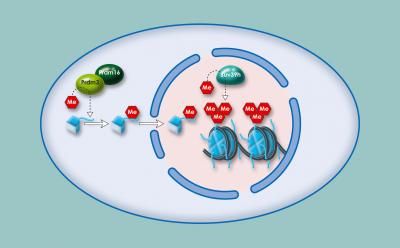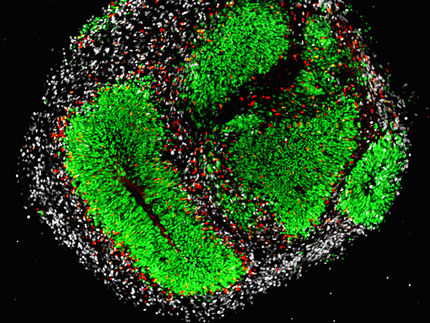Cancer research: Enzyme inhibition with a surprise
In many tumours specific enzymes involved in regulating gene activity are heavily mutated. What effect could that have? Cell researchers from the University of Würzburg have looked into this question.
Matthias Becker and Professor Albrecht Müller, two molecular biologists from the Julius-Maximilians-Universität Würzburg (JMU) in Germany, are interested in the group of so-called KDM6 enzymes. These enzymes are very frequently mutated in bladder cancer, leukaemia and other cancer types so that they no longer function correctly.
How exactly the mutations work inside the cancer cells is still unknown. But the Würzburg scientists have found first hints: The mutations seem to contribute to accumulating DNA damages.
All KDM6 enzymes inhibited
This finding has been made in experiments conducted by Christine Hofstetter, Becker's former doctoral student. The biologist inhibited the activity of all KDM6 enzymes in embryonic stem cells of mice and in embryo-like structures. The latter are spherical structures consisting of several hundred cells that cannot develop into an organism.
The embryo-like structures died as a result of enzyme inhibition. The JMU researchers detected massive accumulations of DNA damages in their cells. Surprisingly, these effects did not occur in the embryonic stem cells: Neither the gene activity nor the cells' ability to survive changed.
"We conclude from our results that there is a fundamental difference when treating DNA damages in stem cells and in the differentiated cells evolving from them," Becker says. The molecular biologists now intend to study this difference in more detail.
The work was conducted within the scope of focal programme 1463 "Epigenetic Regulation of normal hematopoiesis and its dysregulation in myeloid neoplasia" funded by the German Research Foundation (Deutsche Forschungsgemeinschaft, DFG).
Facts about KDM6 enzymes
The investigated KDM6 enzymes are lysine-specific demetyhlases 6. In "normal mode", they remove methylations at the amino acid lysine 27 of histone H3, causing genes to be activated. Histones are proteins that package and order the DNA inside the cell nucleus. Moreover, they influence gene activity in the individual sections of the DNA.
Original publication
Most read news
Other news from the department science

Get the life science industry in your inbox
By submitting this form you agree that LUMITOS AG will send you the newsletter(s) selected above by email. Your data will not be passed on to third parties. Your data will be stored and processed in accordance with our data protection regulations. LUMITOS may contact you by email for the purpose of advertising or market and opinion surveys. You can revoke your consent at any time without giving reasons to LUMITOS AG, Ernst-Augustin-Str. 2, 12489 Berlin, Germany or by e-mail at revoke@lumitos.com with effect for the future. In addition, each email contains a link to unsubscribe from the corresponding newsletter.






















































